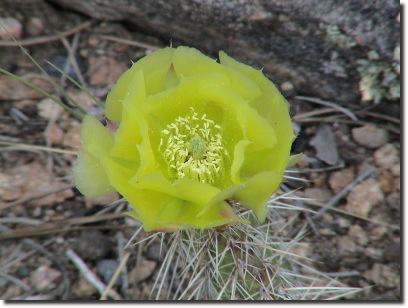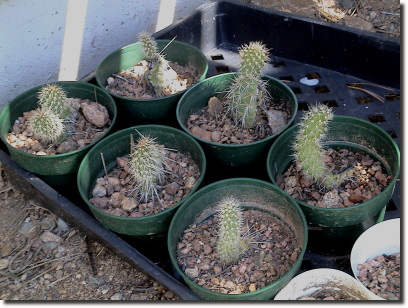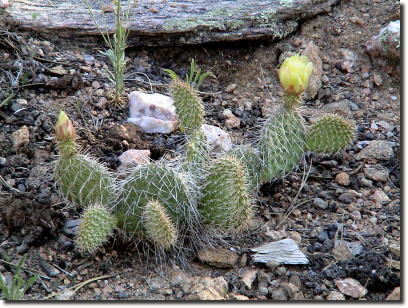Opuntia macrorhiza

Seed
No experience.
Cutting
2003 During the summer, my husband and I were hiking in an area where prickly pear were abundant. In the middle of a trail, I found a broken off clump of pads. Rather than let the cutting die, I picked it up (carefully) and put it in my pack.
When I got home, using a piece of newspaper to hold a pad, I cut each pad in half horizontally. I allowed the cut edge on the pads to callous for about 5 days and then planted them in separate plastic posts with decomposed granite as the soil. I put the pots under our deck where they would get some afternoon sun and rarely watered them. Over the winter, I did not even cover them.

2004 Here are the cuttings the next April. They wintered fine in the small pots.

There are the same cuttings in September of that year. Notice the growth that started. The only water these cuttings got was rain; I really neglected them and never moved the cuttings, never fertilized them, and never watered them.
I had read that the cuttings needed to be in the same orientation they originally grew in. i.e. the bottom of a pad needed to be downward; the top part of a pad needed to be upright. Since I had cut the pads in half horizontally, I had to turn the bottom pads upside down so the cut end was in the decomposed granite. It did not make a difference; these upside down pads grew the same as the pads oriented as suggested.
Transplant
2005 In May, I planted 5 of the cuttings in my big rock garden and one on a very sunny area near our east meadow. I only watered the transplanted cuttings once or twice the entire summer. Again, I really neglected them.

2006 This image shows one of the cuttings planted in my big rock garden in February of the following year. All 6 cuttings were living but were growing very slowly.

2008 This image shows the same prickly pear cactus. All the cuttings now have multiple pads although some have many like this one and a couple have only 4 pads. Two of the prickly pear cactus bloomed this year. The image at the beginning of this page was one of the blooms
Future Plans
I would like to try starting some prickly pear from seed. Hopefully now that the prickly pear cactus are flowering, I'll have some seed.
Related Links
Colorado State University Cooperative Extension, Horticulture, "Propagating Prickly Pear Cactus"
Cooperative Extension. University Of California, Family Farm Series, "Prickly Pear Cactus Production"